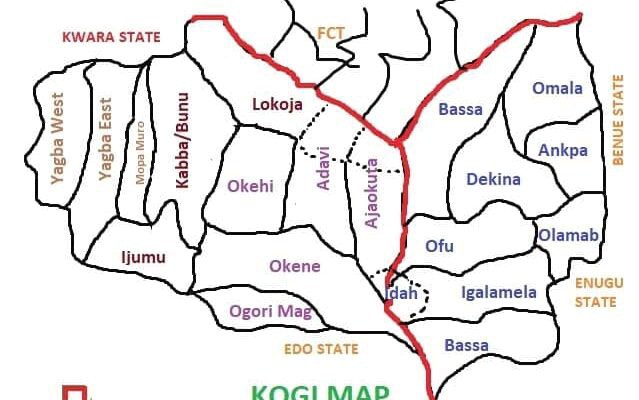Anything history, I always distance myself because only God Has the true Carbon copy of life’s History with events from the genesis to the present time. But for the counter arguments in link to the agitation of Okura State with the alleged inclusion of Ajaokuta and the previous queries raised by some youth of Ajaokuta on their paternity, which seems censuring the history of Ebira Nation, that they coincide to be the reasons for the Igalas to lay claims on the LGA in the time past, I feel I need to do this.Firstly, from my findings, I grasped that the history of the Ebira people, the Igalas and their migration to the Present day Kogi State are somehow intertwined.In the generally endorsed published stories of a history enthusiast, Officer Yakubu Momoh, it states that, oral tradition and written agreed that the ancestors of Ebiras around Niger-Benue confluence hailed from the ancient Jukun, at Wukari the Kwararafa kingdom of the present day Jukun community in Taraba state, Nigeria, all the way from Yemen. It reveals further that the Ebira community later left Jukun to Idah, part of the present Kogi state.In a synonymous Igala history, it is said that the Igalas too had earlier before the Ebiras migrated from Egypt around river Nile through various places in Borno state to Wukari where they settled with some tribes before they migrated to Ife and then to Idah to form their present day territory.The interwoven of culture we have noticed among the Igalas and Ebiras bearing the same title, clans and masquerade costumes was dated back to 1248-1272 AD.My findings from some papers such as Int. Journal of Arts and Humanities, Pulse Nigeria etc reveal that the Igala kingdom was not established until the mid-1550s when their first Attah Ebule-Jonu (a woman) founded it. In fact, some had claimed that her husband was an Ebira Man. While history of her husband’s origin and children were unclear, she was known to be a daughter to Abutu-Eje who was later succeeded by her brother Aganapoje. Aganapoje’s son Idoko became the next Ata, and his two sons, Atiyele and Ayegba, went on to establish their own kingdoms. Atiyele founded the Ankpa kingdom (Éjé Ankpa), while Ayegba succeeded his father as the Ata of Igala. This is in accordance with Ogido, 2004, who opines that Ebira people met the Igala kingdom already established with Kinship structure, and with the reign of the Atta (Father) of Igala in Idah.A consistent Ebira history has it that Ebira is however a Prince Of Junkun of the Kwararafa state north of the Benue River in present-day Taraba State. Ebira relics of trace from Junkun, Kwararafa is the Apete stool, their symbol of authority and identity as a group within the kingdoms of Kwararafa and are Major Warrior, Hunter, Iron Bender, and Farmer.From the History also, the incessant invasion of Igala Kingdom by The then Benin Kings, The Igbos and other Kingdom they shared linkages with, made the Atta of Igala invite the Ebira (Prince of Jukuns) who came with the Group of his Men From Jukun Kingdom. Thus, the Idah-Benin war (1515-1516) was a war of mutual independence because Igala was not Alone in the Battle Field.After The war, a non-fulfilment of Promised by Atta Igala to The Ebira Group led to a Land dispute between the two groups in Idah. This led to a parting of ways, and the Ebiras moved southwest.Before Ebira left Idah, both Igala and Ebira Empires had been co-influenced by Ebira, Yoruba, Edo, Idoma. That is, there has been Lingual mixed with Yoruba and Igbos because of inter-language communication during Translactic Slave Trade.Ebira had a stop by at Itobe (Étte-Ube). The Remaining Ebira Group That left Idah were ITAAZI (Ebira tao) IGU (Ebira koto), PANDA (Ebira Toto, Nasarawa,) AGATU (Ebira Benue, the Father of Ebira MOZUM that choose to Settle Among Basa and Finally UNO (Ebira Ètè-Uno, of Edo) who choose to cross the River Benue with ITAAZI.Ebiras separated at Itobe (Étte-Ube) after misunderstandings on where to settle since they are all Brothers with different occupations. IGU who has a great passion for fishing decided to settle at the river bank. While ITAAZI who Married Atta Igala Daughter was a hardworking man who considered fishing a lazy work so he moved southward into the forest Across the river with his wife and started Hunting and farming. He had his popular Daughter, Ohunene in Ajaokuta, where Eganyi District is later formed.All Members of the various clans in Ebira Tao are descendants of the children of ITAAZI. ITAAZI had five (5) sons namely, 1) Adaviruku/Ohizi, 2) Ododo, 3) Obaji, 4) Uga, 5) Ochuga/Onotu).Ohizi (Adaviruku) had five children who are progenitors of the five traditional Adavi clans named after them. They occupied the present day Ajaokuta, Adavi, Okene, Okengwen, Okehi, Eika, Ihima, Osara, Osisi Among Others. So, importantly, Ohuenene was born and has her root in Eganyi in Ajaokuta, however Ohizi (Adaviruku) had progenitors that occupied their first ancestral

Ajaokuta in Okura Uproar Ohunene Itaazi’s Myths: Assessing the Ebira-Igala History, Beyond Ethnic Narratives
Views: 304



Average Rating